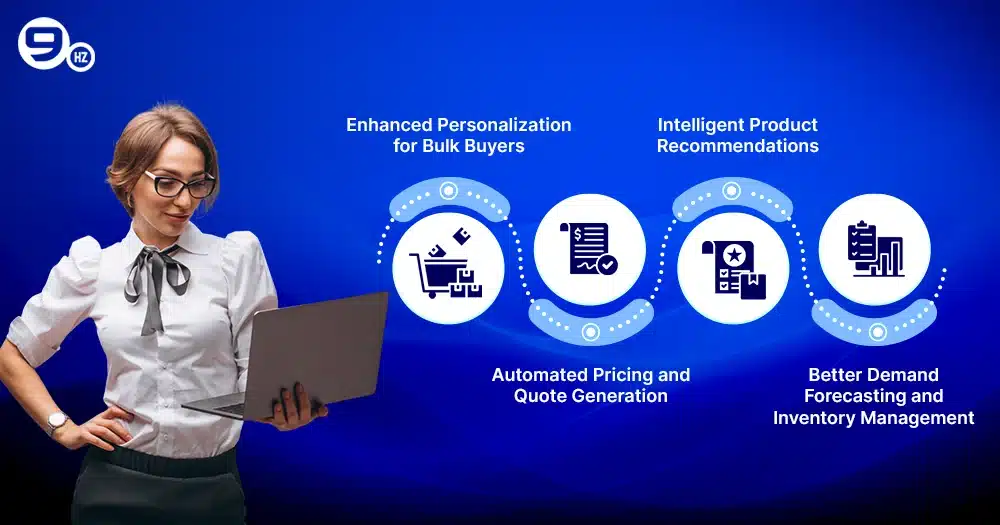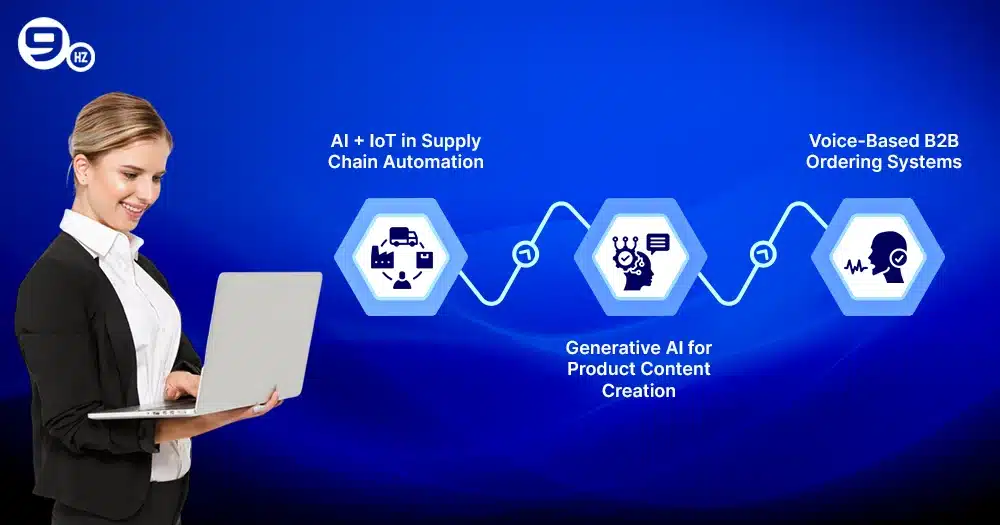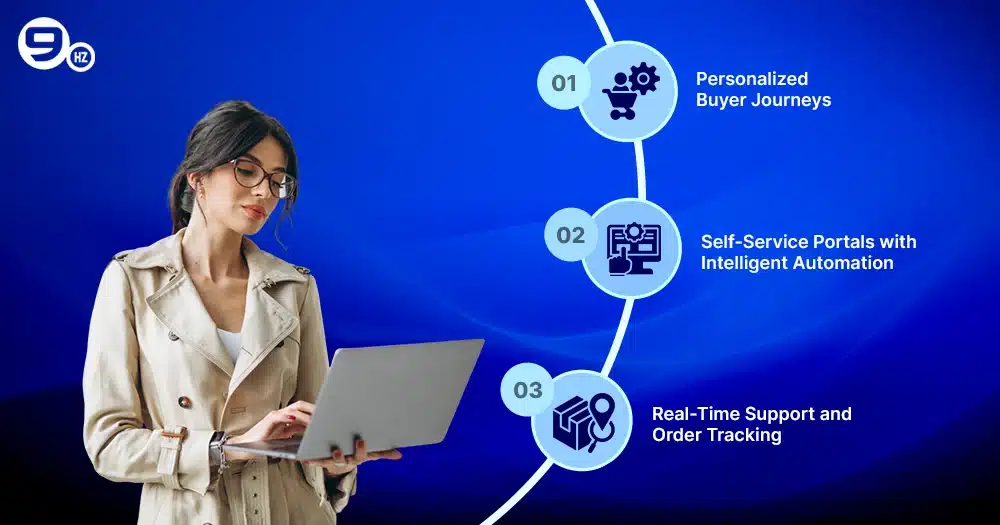Imagine a business where every connection with a customer is unique, every choice is based on data, and computers handle everything from shipping to keeping track of stock. AI in B2B eCommerce has made this possible now, and has remarkable potential to expand even more.
Grand View Research says that the global AI sector would grow at a CAGR of 37.3% and be worth $1,811 billion by 2030. People used to think that AI could never change B2B transactions, yet it is doing just that. It is changing the way supply chain management is done by making things more personal, streamlining processes, and completely changing the way things are done. Companies that have to deal with complicated sales cycles, a lot of orders, and a variety of ways that customers discover them need AI’s ability to look at a lot of consumer data.
AI is changing the way firms work in the B2B sector extremely quickly. AI is a key part of modern digital business since it automates tasks that used to be done by hand and helps people make better decisions based on data. McKinsey’s study shows that using AI in sales and the supply chain has raised B2B profit margins by well over 20%. This shows that AI isn’t just a trend; it’s something that has to be done.
Let’s look more closely at how AI is changing the future of B2B businesses.
What is AI in B2B eCommerce?
Artificial intelligence (AI) in business-to-business (B2B) eCommerce is when smart computers and programs make decisions like a person, execute difficult jobs, and learn more by utilizing data to make choices. These AI tools use past data, data on what customers have bought, and real-time analytics to make company operations better throughout the B2B chain.
B2C businesses use AI to improve direct contact with clients by sending them personalized ads and brief tips. AI is used in B2B eCommerce to make things that are hard easier. It implies adding AI features to systems that are already in place so they can manage a lot of products, massive orders, changing prices, and long-term contracts. B2B customers also want all of their contacts to be clear, honest, and done automatically. This is why AI is so vital for keeping companies running efficiently and consumers pleased.
How Use AI in B2B eCommerce?
AI in B2B eCommerce makes things run more smoothly by getting rid of boring activities, letting you use predictive analytics, and making it easier to keep track of products and the supply chain. It uses consumer data to help businesses make better choices, run more smoothly, and keep consumers pleased with complicated B2B processes. AI may be employed in B2B in a number of different ways:
- You may save time by automating things like accepting orders, sending invoices, answering questions, and improving customer satisfaction.
- Going through customer data to provide each buyer a more personalized experience.
- Applying such predictive analytics to know how many things to order and what future demand may be.
- Fulfill the answers to common questions and onboarding of new employees with the help of virtual assistants and chatbots.
- Employing the AI technology to operate the supply chain through automating the work in such areas as transporting and office work.
Pro Tip: To get better results, hire eCommrece development company which develop AI software that works well with your ERP, CRM, and eCommerce systems.
Examples of AI in B2B Businesses
At the practical level, companies resort to AI applications such as automatic supply of quotes, demand forecasting, and the utilization of robots to assist consumers in the real world. Organizations such as Salesforce and GE utilize AI to make data-driven decisions, communicate with customers, and monitor their supply chains. This assists them in performing well in digital trading, and their work becomes more efficient. The following real B2B examples give you an idea of how AI works:
1. Predictive Analytics for Demand Forecasting
Robots that make intelligent projections about what people would like to purchase next rely on the data on previous sales, purchase patterns, and market trends, such as AI systems. This helps businesses keep their stock levels up to date, choose better products to buy, and move their goods around faster.
Example:
GE (General Electric) uses predictive analytics to figure out when machines will break down and change the amount of stock it has on hand in real time. This renders the process of running the supply chain easier and reduces downtime.
Revolutionize Your Store With AI-powered eCommerce Solutions
2. Automated Pricing and Dynamic Quotes
AI-powered shifting pricing algorithms change quotations based on sales, customer information, and the prices of competitors. This makes exchange rates better and speeds up the process of making quotes by hand.
Example:
Sales teams may use Salesforce Einstein to automatically determine prices based on what they know about customers, how goods are set up, and how they communicate to consumers. This speeds up and makes conversations more precise.
3. AI-Powered Chatbots and Virtual Assistants
There are robots that are powered by AI, that assist customers in restocking, answering questions and provide real-time reports on transactions without a person. These bots also use data from earlier conversations to provide more personalized advise.
Example:
Many B2B platforms employ IBM Watson Assistant to answer questions regarding support. People are satisfied with this, and it provides them more time to work on tougher problems.
4. Generative AI for Product Content Creation
There are so many things to choose from in B2B that it might take a long time to write certain things by hand. Generative AI is capable of writing product descriptions, user manuals and specifications sheets. It ensures that all things are identical and effective in terms of SEO on a massive scale.
Example:
Alibaba’s B2B platform uses AI to write product descriptions for thousands of ads all by itself. This saves time and makes sure that all the site’s information is of high quality.
5. AI in Supply Chain Optimization
The use of AI allows for keeping track of things in real time, which reduces the price of shipping and makes the supply chain easier to track. It finds spots where things are moving slowly and helps firms solve problems more quickly.
Example:
Siemens uses AI and IoT devices together to make their global supply chain perform better. They use AI to figure out when delivery will be late and move things around as needed.
6. AI-Driven Product Recommendations
AI makes recommendations for products based on what a customer has purchased, viewed, and searched for in the past. This makes it easier to sell more products and services since it gets people more interested.
Example:
Grainger, a big company that offers industrial supplies, uses AI to help you find the proper products and search results. This improves the experience for the customer and makes them desire to buy from them again.
Pro Tip: Look for AI software that can work with your ERP or CRM system. This will make it simpler for data to move around and for tasks to be done smarter throughout your whole platform.
Key Benefits of AI in B2B eCommerce
Artificial intelligence allows personalization more easily, prices are automatically generated, product suggestions are made intelligently, and demand forecasting is also made accurately. AI plays a significant role in expanding an enterprise and remaining a competitive player in the market because it may enhance the user experience, increase sales, reduce transportation expenses, and facilitate the work of companies in a smoother way.1. Enhanced Personalization for Bulk Buyers
AI examines the purchases made by a consumer in the past and the way he/she acquired them to recommend items, prices, and discounts that are more effective for those who make more purchases. This makes the experience of each customer different, thus implying that they have a high tendency to replicate the experience by returning and remaining loyal to the brand.
2. Automated Pricing and Quote Generation
Using dynamic pricing strategies, AI is able to determine the best prices in a short period of time by analyzing market tendencies, the price of rivals, and the characteristics of purchasers. The new developments enable it to close transactions more easily and quickly in the process of sales.
3. Intelligent Product Recommendations
AI suggests things that are relevant based on search trends, customer data, and past purchases. This not only makes it more probable that individuals would purchase more than one item, but it also helps them discover what they want in huge product libraries.
Scale Faster With Intelligent, AI-driven eCommerce Websites and Apps.
4. Better Demand Forecasting and Inventory Management
AI looks at past data and patterns to guess what consumers would want to buy in the future. This helps you retain the right amount of goods on hand, makes it easier to handle data, and cuts down on having too much or too little stock. All of these factors help firms work much better.
Future Trends: What’s Next for AI in B2B eCommerce?
New trends that will emerge involve the application of AI and the Internet of Things (IoT) to automate the supply chain, applying creative AI to write the product descriptions, and voice-based systems to purchase. With the world increasingly going digital, the new concepts will assist businesses to serve their clients better, monitor their products, and conduct operations with each other.1. AI + IoT in Supply Chain Automation
AI and the Internet of Things (IoT) working together change the way supply chain management works. AI-powered smart monitors keep an eye on packages, maintain the building’s temperature stable, and find problems with equipment before they happen. This makes the system a lot more dependable and lowers the cost of shipping.
2. Generative AI for Product Content Creation
Generative AI is changing the way companies create content. AI tools can now write product descriptions, spec sheets, and marketing materials that are correct, good for SEO, and fun to read. This means that teams don’t have to do things by hand anymore.
3. Voice-Based B2B Ordering Systems
Models of voice assistants based on AI allow a B2B buyer to issue orders, track the delivery, and check the stocks by making a few voice requests. This new concept is convenient to the customer and offers an enhanced experience to the buying teams, and this is excellent because they are quite busy anyway.
How AI Improves Customer Experience in B2B
B2B customer journey with AI is improved because AI monitors customer behavior, makes personal suggestions, and assists them immediately. Offering self-service options and providing intelligent tools will make your customers happier, increase the chances of repeat purchase and brand loyalty across any digital commerce platform.1. Personalized Buyer Journeys
AI examines the history of the purchases that a buyer has made, their interests, and activities to customize their experiences. This implies increased interest value by the customers, a tighter focus on marketing, and higher sales.
2. Self-Service Portals with Intelligent Automation
On B2B sites where AI is integrated, customers can process returns, monitor their orders, and respond to frequently asked questions (FAQs). This improves customer service and provides help groups with additional time to respond to challenging questions.
3. Real-Time Support and Order Tracking
Chatbots on AI can assist you on a real-time basis, respond to queries by customers and offer you what you bought anytime of the day or night. When one is able to communicate with somebody in real time, the levels of trust, customer satisfaction, and repeat purchases all rise.
Make Your eCommerce Future-ready With Cutting-edge AI Development.
Challenges Associated with B2B eCommerce AI
B2B eCommerce has much potential with the application of AI, yet it also poses major challenges. There are many causes why AI might be difficult to use or, rather, slow; there are issues with data and the interface. With the right plan and corresponding tools, companies can overcome these issues and maximize AI.
Now, let’s speak about five big problems that B2B companies have to deal with and how to fix them:
1. Poor Data Quality and Fragmented Sources
Challenge:
To be functional, the AI systems require dependable data. However, many B2B companies have other systems recording obsolete or inaccurate customer details. Thus, complicates the process of conducting research.
Solution:
Put together, clean, and organize data using unified inventory management tools. Putting money into real-time data flows will make it easy for your AI systems to go through a lot of historical sales and customer buy history.
Example:
Cisco fixed the problem with data separation by adopting a master data management system and AI-powered analytics. This made the data better and changed how consumers used it.
2. Complex Integration with Existing Systems
Challenge:
Among many companies, few get their post-10-year-old systems, like ERPs or eCommerce platforms, to work with new AI solutions. This is time-wasting and prolongs matters.
Solution:
Pick AI systems with open APIs that are easy to connect to. Work with providers that can make customized connections for your IT stack to make sure that the implementation goes well.
Example:
Honeywell worked with IBM Watson to integrate AI to their industrial systems, which helped them get around this problem. This made the rollout go more easily and enabled us keep an eye on how things were going in real time.
3. High Implementation and Maintenance Costs
Challenge:
For small and medium-sized B2B businesses, setting up the necessary tools and teaching employees how to utilize AI technology may be quite costly at first.
Solution:
Begin with cloud-based AI software that may be changed as required. Start with low-cost technology like robots or predictive analytics, and then add more when you see a return on investment (ROI).
Pro Tip: A lot of companies have prices that alter based on how frequently you use them. This makes it easier for small businesses growth who want to obtain AI.
4. Resistance to Change and Lack of AI Expertise
Challenge:
Most teams don’t want to embrace AI because they are afraid of automation or don’t know enough about it. This means it takes longer to become used to and makes it less useful.
Solution:
Train people and get teams from other departments involved right away. Instead of worrying about how AI will steal jobs, talk about how it can help organizations run more smoothly by getting rid of boring chores.
Example:
Schneider Electric spent a lot of money on training and managing change for AI. This helped teams learn how to use new AI features and get used to the new ways of doing things.
5. Security and Compliance Concerns
Challenge:
People are apprehensive about how to use AI systems when they handle sensitive personal data, how to follow rules like GDPR, and how to keep data safe.
Solution:
Pick AI systems that already have security, access control, and compliance monitoring built in for your data. To keep things clean and your consumers’ trust, verify your audit systems often.
Pro Tip: Include security in your AI strategy early on, so the customers remain happy and safe in the future.
By addressing these problems, B2B firms will be able to maximize the use of AI. This will satisfy the customers, increase sales, and prepare them to be successful in the competitive online business in the long run.
How to Start Integrating AI into Your B2B eCommerce Platform
You must review the systems you currently have, define a best D2C eCommerce strategy and start with simple tools before you embark on using AI. Select AI solutions that are able to transform and improve things by making them easier to achieve and better enjoyed by the customers, streamline operations, and deliver the defined beneficial outcome. The extent to which you keep pace with market dynamics and the extent to which you are able to manage your data could touch on the extent to which your business would succeed in the long run.
1. Step-by-Step Approach for Implementation
The first step is to uncover problems with the process, collect trustworthy information, and set clear goals. AI software could help you win little things like chatbots and data. Grow your company slowly so that you can better manage your supply chain, predict what customers will want in the future, and make hard business tasks easier to do.
- You should look at the existing tools and find out whether there are improved methods of managing customer service or data.
- When making AI goals, the customer experience should be improved, the supply chain should be faster, or sales should be larger.
- Be content with basic technology, such as robots or predictive analytics, and progressively work towards more complicated options.
- Pay to prepare your data so that AI models can learn from that data.
- Ensure that a new system works in collaboration with the existing digital framework.
Pro Tip: Appeal to the low-hanging fruits that demonstrate the amount of money to people so that they embrace the growth of AI.
2. Choosing the Right AI Tools or Partners
Pick AI apps that can manage a lot of data, work with other systems, and fit with how your business works. Look for partners that can help you create, train, and manage data-driven AI solutions so that they work well together and provide customers a better experience. To choose AI apps or service providers:
- Select solutions that have been previously implemented in B2B environments.
- Ensure that the tools support large amounts of data, have CRM integration, and can do such things as answer customer questions or automatically suggest items.
- As a way of ensuring seamless AI implementation, you need to identify vendors that provide constant support, customization, and training
.
3. Measuring ROI and Performance
Monitor other important performance indicators such as customer satisfaction, revenue growth and product levels. Consumer data and social media efficiency will help you see how successfully AI was employed and guide you on how you can improve your marketing and customer service in the years to come. Look out for these important indicators:
- More business from consumers who come back, and more people who buy things
- Less work that has to be done by hand and lower company costs
- How quickly can you accept orders, make quotes, and get help
- Better handling of supply and prediction of demand
- Cross-selling, upselling, and better targeting all help you sell more.
- Change your plans based on what you find out to make sure AI is beneficial in the long term.
Conclusion
In a world where everything is fast, customised and efficient, AI is not just a want anymore when it comes to B2B eCommerce; it’s a requirement. AI contributes towards the growth of the business, helps it manage its supply chains and makes its consumers happy through hard work and simplifying data management.
However, it is time-consuming to apply AI. Whether a B2B company is big or small, it can transform outdated models into smart, scalable and future-ready communities provided it has the correct approach, tools, and attitude.
The application of AI enables organizations to operate smoothly and provides them with new avenues to communicate with customers through the analysis of customer personal data, employing predictive modelling, and staying abreast of market trends. We need to invest in AI, think outside of the box and be the star of B2B trade where everything keeps on changing.
FAQs on AI in B2B ecommerce
1. How is AI transforming B2B eCommerce operations?
The introduction of AI in B2B eCommerce is making things run smoothly by eliminating monotonous tasks, tracking goods to ease supply chain management, and making decisions and forecasting what the situation would become using data.
2. What are the key benefits of using AI in B2B eCommerce?
AI technologies enable you use dynamic pricing, automate quotes, keep customers happy, and speed up business operations. This implies that the firm will grow and make more money.
3. Can AI improve customer experience in B2B eCommerce platforms?
Yes, the technologies of AI better equip the customer experience by offering a unique and exclusive experience to customers, fast answers to their queries, and intelligent self-service. This increases the willingness of the clients to purchase again and remain loyal to the company.
4. What are some real-world use cases of AI in B2B online selling?
Companies like Salesforce and Siemens use AI to forecast what customers will want in the future, create content using creative AI, and keep track of consumer data to make online shopping better.
5. Is AI implementation cost-effective for small and mid-sized B2B businesses?
Indeed, there are plenty of applications of AI functions, such as robots and predictive analytics, to enhance consumer experience, reduce expenditure, and expand the business at an accelerated rate, even in small B2B operations.
Great Together!












